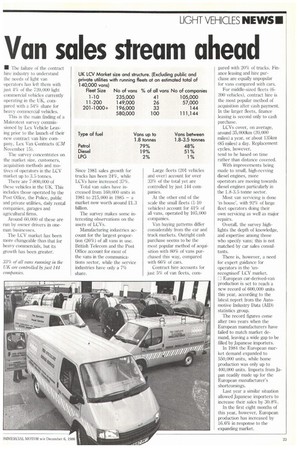Van sales stream ahead
Page 35

If you've noticed an error in this article please click here to report it so we can fix it.
• The failure of the contract hire industry to understand the needs of light van operators has left them with just 4% of the 720,000 light commercial vehicles currently operating in the UK, compared with a 54% share for heavy commercial vehicles.
This is the main finding of a Mak rotest survey commissioned by Lex Vehicle Leasing prior to the launch of their new contract van hire company, Lex Van Contracts (CM November 15).
The survey concentrates on the market size, customers, acquisition methods and motives of operators in the LCV market up to 3.5 tonnes.
There are 7-800,000 of these vehicles in the UK. This includes those operated by the Post Office, the Police, public and private utilities, daily rental companies, garages and agricultural firms.
Around 60,000 of these are run by owner drivers in oneman businesses.
The LCV market has been more changeable than that for heavy commercials, but its growth has been greater. Since 1981 sales growth for trucks has been 24%, while LCVs have increased 37%.
Total van sales have increased from 160,000 units in 1981 to 215,000 in 1985 — a market now worth around £1.3 billion.
The survey makes some interesting observations on the users of LCVs.
Manufacturing industries account for the largest proportion (26%) of all vans in use. British Telecom and the Post Office account for most of the vans in the conuntmications sector, while the service industries have only a 7% share. Large fleets (201 vehicles and over) account for over 33% of the total yet are controlled by just 144 companies.
At the other end of the scale the small fleets (1-10 vehicles) account for 41% of all vans, operated by 105,000 companies.
Van buying patterns differ considerably from the car and truck markets. Outright cash purchase seems to be the most popular method of acquisition with 80% of vans purchased this way, compared with 66% of cars.
Contract hire accounts for just 5% of van fleets, com pared with 20% of trucks. Finance leasing and hire purchase are equally unpopular for vans compared with cars.
For middle-sized fleets (6200 vehicles), contract hire is the most popular method of acquisition after cash payment. In the larger fleets, finance leasing is second only to cash purchase.
LCVs cover, on average, around 35, 000km (20,000 miles) a year, or about 135km (85 miles) a day. Replacement cycles, however, tend to he based on time rather than distance covered.
With improvements being made to small, high-revving diesel engines, more operators are moving towards diesel engines particularly in the 1.8-3.5 tonne sector.
Most van servicing is done 'in house', with 92% of large fleet operators doing their own servicing as well as major repairs.
Overall, the survey highlights the depth of knowledge, and expertise among those who specify vans; this is not matched by car sales consultants.
There is, however, a need for expert guidance for operators in the 'unrecognised' LCV market. E European car-derived-van production is set to reach a new record of 600,000 units this year, according to the latest report from the Automotive Industry Data (AID) statistics group.
The record figures come after two years when the European manufacturers have failed to match market demand, leaving a wide gap to be filled by Japanese importers.
In 1984 the European market demand expanded to 550,000 units, while home production was only up to 400,000 units. Imports from Japan readily made up for the European manufacturer's shortcomings.
Last year a similar situation allowed Japanese importers to increase their sales by 30.8%.
In the first eight months of this year, however, European production has increased by 16.6% in response to the expanding market.














































































































